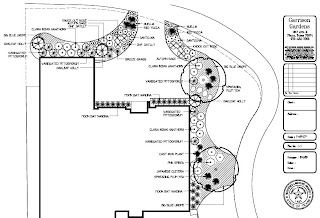



The owners of this Allen, Texas residence contacted Garrison Gardens to explore some landscape design ideas and develop a plan that could be completed in phases. This property featured some unique challenges being situated on a corner lot with an alley on the east side. The easement to the back of the property limited the depth of the planting beds.
One of the first needs discussed was some shade and screening along the west fence line. We designed a mixed tree line consisting of Red Oak and Crape Myrtle, with a planted bed underneath. The initial phase addressed the trees with the landscape bed designated to a later phase. The plantings around the swimming pool were also assigned to the initial installation. We selected shrubs and ornamental trees that would thrive in the intense west sun. Some of the plant material selected included Knock Out Rose, Silverado Texas Sage, Indian Hawthorn, Vitex, and Salvia.
We also worked on phase one for the front yard and that will be shown in a later post.















































